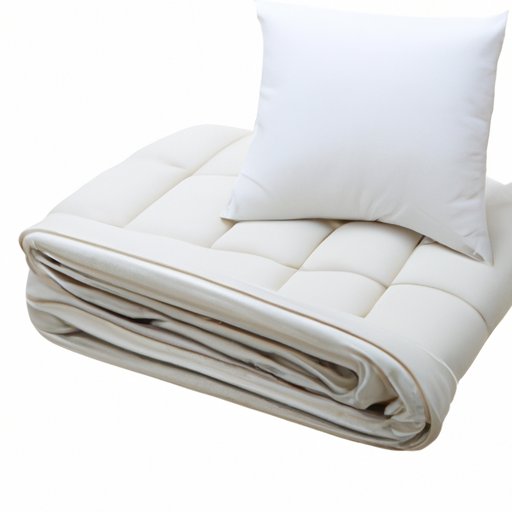
I. Introduction
It’s essential to keep our bedding fresh and clean for a good night’s sleep, and washing a comforter is no exception. Yet, it can be intimidating to wash such a bulky and delicate item. Proper washing techniques ensure that your comforter remains clean and maintains its quality over time. This article will provide a detailed guide on how to wash a comforter, including best practices and expert tips.
II. Step-by-Step Guide
The following steps are necessary to wash a comforter:
List of necessary materials:
- Laundry detergent
- Vinegar (optional)
- Dryer balls or clean tennis balls (optional)
Tips for selecting the right laundry detergent:
Choose a mild and gentle detergent, particularly if your comforter is made of delicate materials like silk. Avoid detergents that contain bleach, fabric softeners, or brighteners, which can damage the comforter’s fabric.
Instructions for setting the washing machine:
- Check the care label on the comforter for specific washing instructions.
- Place the comforter in the washing machine and add the mild detergent. Use cold or warm water.
- Add a cup of white vinegar to boost the cleaning process and remove any odors.
- Select the gentle cycle option and start the washing machine.
Guidance on drying the comforter:
- Remove the comforter from the washing machine and place it in the dryer.
- Set the dryer to low heat or air-dry settings to prevent shrinkage or damage.
- Add dryer balls or clean tennis balls to the dryer to loosen the clumps and distribute the filling.
- Check the comforter regularly, remove it from the dryer once it is dry, and fluff it up to restore its shape and fill power.
III. Best Practices
It’s important to follow some best practices when washing a comforter:
How to avoid potential cleaning issues:
Do not overload the washing machine with other clothing items or heavy bedding materials. Doing so can cause unbalanced loads and damage the comforter.
Tips for preserving the quality of the comforter:
Make sure to wash the comforter regularly and follow the care instructions on the label. Avoid exposing the comforter to direct sunlight, as this can cause discoloration and damage to the material.
Advice on selecting the best washing machine cycle to use:
The gentle cycle is the best option for comforters, while the heavy-duty cycle can damage the filling and fabric.
IV. Expert Tips
Here are some additional tips from the experts:
Advice from laundry service professionals, bedding manufacturers, and others with relevant experience:
- It’s best to wash a comforter alone to avoid possible tearing of other clothing items or the comforter itself.
- Consider using a front-loading washing machine, as they are gentler and more efficient in washing bulky items.
- For down comforters, use a low-heat or air-dry setting and remove it regularly to fluff it up.
V. FAQ
Here are some frequently asked questions about washing comforters:
Common questions about washing comforters:
- How often should you wash a comforter? It’s best to wash a comforter at least every six months or whenever it is visibly dirty or stained.
- Can you use bleach to wash a comforter? It’s best not to use bleach on a comforter, as it can damage the fabric and filling.
Answers to questions about how to remove stains:
- How to remove bloodstains? Apply cold water immediately to the stain and avoid using warm or hot water, as it can set the stain. Use a mild detergent and repeat the process until the stain is removed.
- How to remove wine stains? Blot the stain with a clean cloth or paper towel, then sprinkle baking soda to absorb the stain. Then, apply a mixture of hydrogen peroxide and dish soap and let it settle for an hour. Rinse the comforter thoroughly with cold water and wash it in the washing machine.
VI. Video Tutorial
We’ve prepared a video tutorial for you to follow while washing your comforter. Our step-by-step tutorial emphasizes the best practices and tips mentioned in this article. Check it out:
A brief summary of the video content:
The video provides a visual demonstration of how to wash and dry a comforter properly. It covers key steps, including the selection of laundry detergent, setting up the washing machine, and drying the comforter with dryer balls or clean tennis balls to restore its shape and fluffiness.
VII. Conclusion
Washing a comforter is an essential yet intimidating task because of its size and delicacy. However, following the best practices and expert tips provided in this guide, you can ensure that your comforter remains clean and high quality for years to come. Remember to check the care label, select a mild detergent, and use the gentle cycle option when washing your comforter. With regular washing and care, your comforter will remain fresh and cozy for a good night’s sleep.





